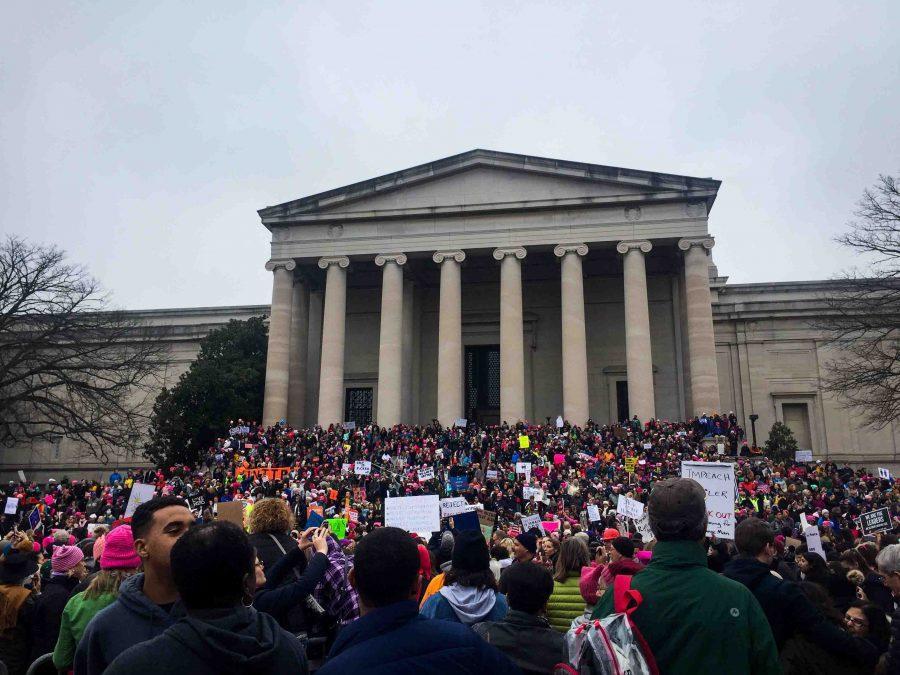NYU Students Travel to D.C. to Join the Women’s March
Protesters marching in Washington as part of the Women’s March on Washington.
January 23, 2017
NYU students ventured far from home on Jan. 20 to join the 500,000 protesters in Washington, D.C. marching in solidarity for women’s rights the next day during the Women’s March on Washington.
The Women’s March, which called for women’s, LGBT and civil rights, boasted a diverse crowd holding signs reading “I’m With Her” and “Not My Pussy.” Many NYU students traveled directly from New York to D.C. to participate in the Women’s March. According to CNN, police arrested 217 protestors at the inauguration protests in D.C. on Jan. 20; however, no NYU students were arrested or injured. No one was arrested during the Women’s March the next day.
Silver School of Social Work freshman Kaela Vecchia-Zeitz went to both the inaugural protest and the Women’s March with two other NYU students. Vecchia-Zeitz said that unlike the protests on Inauguration Day, the Women’s March went peacefully. People walked in an orderly fashion and only a few conflicts occurred.
“Today has been incredibly hopeful,” Vecchia-Zeitz said. “We walked down Constitution Ave, starting at the Washington Monument all the way to Lincoln Memorial. There [were] hundreds of thousands of people marching through the streets chanting and singing. There was a bit of an argument between a protester and an anti-abortion picketer, but other than that I haven’t seen or heard of anything.”
CAS freshman Nicol Herrera said that the comparative turmoil on the first day of protests could likely be explained by the mixed crowd of Trump supporters and aggravated protesters. She said that the attitude of security also added to the tension.
“The security was really intense,” Herrera said. “There were snipers on top of the buildings watching and pointing their guns. And the police and military were not very nice. I think they were mostly not nice to the protesters — one called my friend stupid and was very rude.”
GLS freshman Laura Fernanda Ochoa-Rincon and her friend, Gallatin freshman Rebecca Karpen, went to the protest prepared with signs. Ochoa-Rincon said that although she has experienced inequality since she came to the United States as a refugee, the present political climate of the country is so chaotic that it is time to take action.
“The idea to come up and protest really came the second CNN announced they predicted the president-elect would be Trump,” Ochoa-Rincon said. “I knew that during such a turbulent time in politics I couldn’t afford to just tweet about it — I had to do something. A man-child who bullies his way to the top normalizes his behavior. I want to stop the normalization of this ludicrous behavior.”
Ochoa-Rincon also said the ultimate goal of protesting is not to obstruct Trump’s inauguration, but to call for change in the current U.S. voting system.
“I’m not going to be naive and pretend a protest could actually change Trump going into the White House,” Ochoa-Rincon said. “I believe the protests will bring about change because they draw attention to the fact that Trump lost the popular vote by almost 3 million. [That] is a huge amount considering that in a country of about 300 million, only 30 percent of the country goes out and votes. The goal of the protest is to draw attention to that — let our senators and representatives know that their constituents are not happy.”
Ochoa-Rincon said the protests in D.C deliver a strong message about the upcoming fight in the following four years.
“The protests let people know that this is going to be a hard, uphill battle, but that we will fight through everything that will be thrown at us,” Ochoa-Rincon said.
A version of this article appeared in the Monday, Jan. 23 print edition.
Email Coco Wang at [email protected].
























































































































































